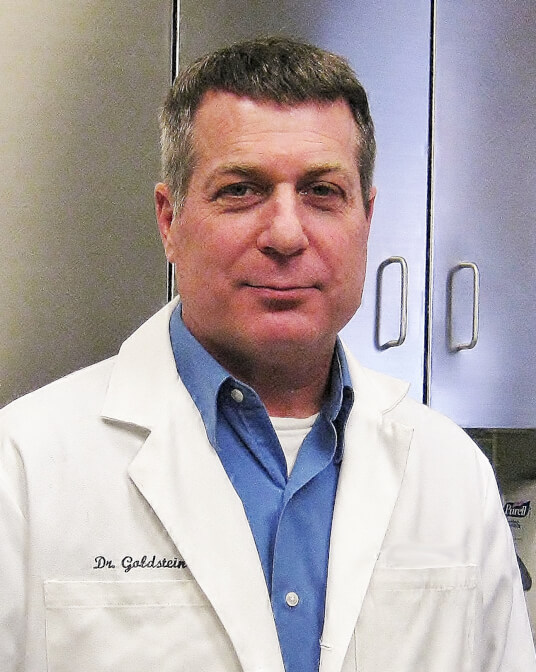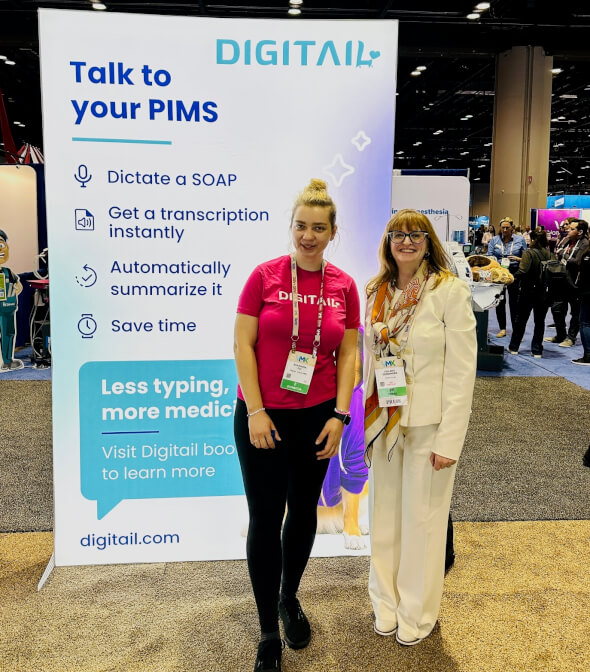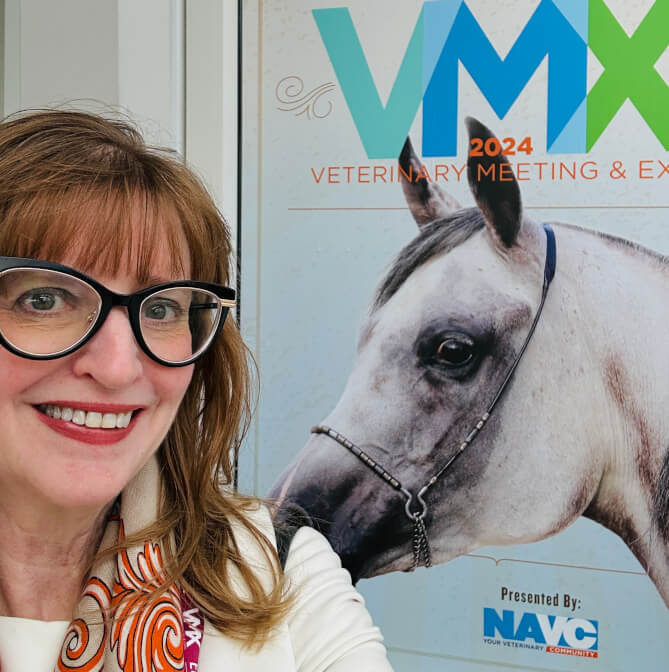It was only a few short weeks ago that I headed to VMX, one of the largest veterinary conferences in North America. Right on the heels of VMX, I started the spring semester of my doctoral studies at the University of Missouri and delivered a presentation on AI at the Missouri Veterinary Medical Association annual conference.
This is “Part One” of my learnings of what’s going on with AI in veterinary medicine. As with the rest of us, there are segments of veterinary medicine that are saying no way, others that are all in, and primarily, those that seek to understand AI by testing it and attending lectures and programs. I am delighted to report the most important topic and relative to my doctoral research, is responsible AI.
At VMX AI was front and center in lectures and from leading companies and entrepreneurs. I attended an excellent series of lectures by Jonathan Lustgarten, MS, PhD, VMD, CSPO. Dr. Lustgarten is a former president of the Association for Veterinary Informatics. As Dr. Lustgarten says, “I am dedicated to revolutionizing the veterinary experience by developing and integrating advanced technology such as AI and Large Language models like ChatGPT, while preserving the personal touch that defines veterinary medicine.”
While speaking to him after his lectures, I can affirm that Dr. Lustgarten’s down-to-earth approach to the complexities of navigating this new AI terrain will put veterinary medicine in good stead. He readily acknowledges that organizations in veterinary medicine must deploy responsible AI to maintain the trust our pet parents place in the veterinary profession. For individual veterinarians, this means deploying a well-thought-out Responsible AI plan for the clinic itself in addition to ensuring an understanding of how AI products are developed and used.
The leaders in the field of diagnostics such as Zoetis and Idexx each introduced their respective AI product offerings — Zoetis with its AI Urine Sediment Analysis Added to Its Vetscan Imagyst Platform and Idexx with its AI-powered Slide-Free Cellular Analyzer, IDEXX inVue Dx.™
According to Dr. Richard Goldstein, Vice President & Chief Medical Officer, of Global Diagnostics at Zoetis, earlier versions of AI were not well-regarded, nor as reliable as they are today. The future of AI holds much promise. The caveat is to not only understand how the datasets for products originated but also how they were trained and what continuous oversight is provided with human intervention.

Dr. Richard Goldstein
In the case of veterinary medicine, this means oversight by veterinary experts at every step of the process. As Dr. Goldstein reinforced, “In veterinary medicine, devices are not regulated by the FDA. Coupled with the complexity of AI, there is a great opportunity to enhance the practice of veterinary medicine, but it is up to us to be responsible in its implementation.” Dr. Goldstein will be presenting on this topic at Western Veterinary Conference:
Responsible AI – A Practical Approach for Evaluating & introducing Diagnostic AI platforms into your Practice
Date: Monday, February 19, 2024, 3:00 PM to 3:50 PM
Not all Artificial Intelligence (AI) is created equally. Join us for a discussion on all things AI to gain an understanding of how to critically evaluate the growing AI offerings in veterinary medicine and use it responsibly to improve patient care. AI won’t replace the veterinary healthcare team, but it offers efficiencies and access to diagnostics resulting in increased quality of care and improved workflow for those that use it.
In Sickness & In Health – When to Test, For What, & How!
Date: Tuesday, February 20, 2024, 4:35 PM to 5:25 PM
This practical case-based presentation will focus on the value of diagnostic testing for apparently healthy animals as well as in various disease states. An emphasis will be placed on the usage of various modalities available today including POC instruments, AI-based systems, digital cytology, and traditional reference lab testing. The pros and cons of each modality in each situation and disease state will be discussed with a focus on best medicine, practice staffing, and efficiency, staff well-being as well as pet owner satisfaction.

Among the entrepreneurial companies that were exhibiting at VMX include Digitail, which will soon release a veterinary AI usage study in partnership with the American Animal Hospital Association, and VEA, an AI-notetaking software that announced a partnership with AI. CEO Patricia Porter’s tech background means she understands and appreciates the importance of responsible AI.
In another development in responsible AI in veterinary medicine, the AVMA is updating its Principles of Veterinary Medical Ethics and Model Veterinary Practice Act. Veterinarians can contact the AVMA with input through March 4, 2024, for this phase. In addition, the AVMA is forming a new Task Force on Emerging Technologies and Innovations. Veterinarians are asked to contact Dr. Gail Golab at the AVMA to volunteer or suggest other candidates for consideration.
Be on the lookout for “Part Two” of Responsible AI in Veterinary Medicine. In the meantime, as I said in my presentation to the MVMA conference attendees, this is a pivotal moment with generative AI. Keep learning, keep testing AI, and gather all you can from the tech companies and your trusted partners to deploy responsible AI. It will pay off, and as with all the professions, this is a story to be continued…
Lea-Ann Germinder
Editor and Publisher, Goodnewsforpets.com
Note: This was an original post, not assisted in any way by ChatGPT. I will explain why in my next post!


